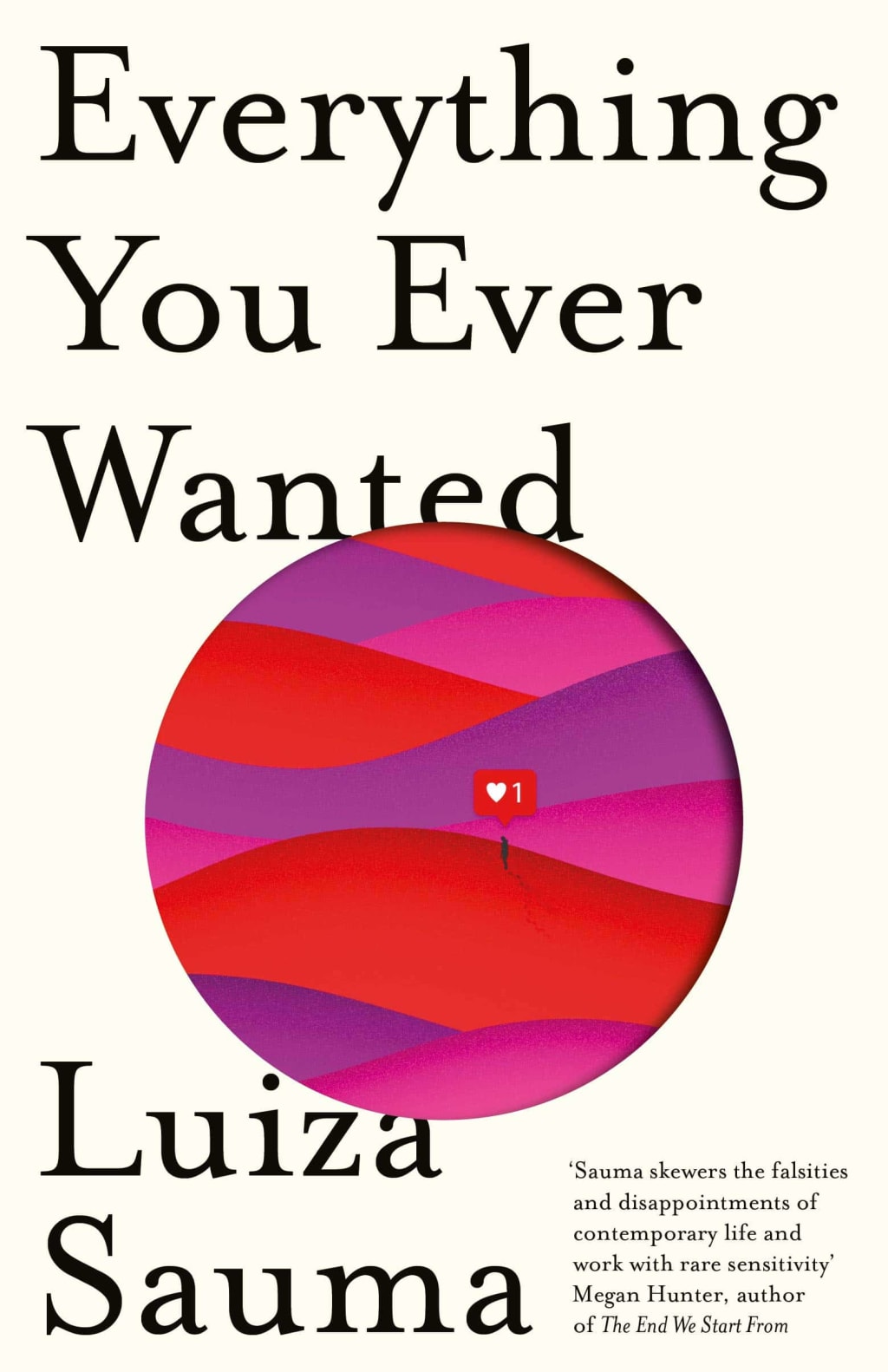Everything You Ever Wanted by Luiza Sauma Book Review
A new-wave dystopian that feels a little too close to home.

Imagine a refreshing coming-of-age dystopian novel set within very dreary and dull modern-day London, depicting a protagonist living an underwhelming, relatable yet horrific existence, who decides to start her life afresh on another planet. That is the context of Everything You Ever Wanted (EYEW) in one sentence. In words, simply "unassuming yet powerful and prolific". The story is told by a young-ish depressed woman named Iris, a Digital Innovation Architect for a company, who often rolls her eyes when she tells anyone her pretentious job title and laughs at what little significance the words have in the grand-scheme of the Universe. She has a lot of complex modern wants, worries and desires, but above all she wishes her life had a greater fulfilling purpose. Her situation is one that I'm sure many of us are fairly familiar with; she feels her life in the modern world is hopeless, ungratifying, and she craves some kind of deeper satisfaction from her actions. So when the opportunity arises for her to change her state of existence completely, she jumps at it and goes to live on the planet Nyx. For the rest of us, sadly, picking up our roots and starting afresh is much more diificult. The only catch is that when she leaves, she can never return.
I was recommended this book by a friend originally. They described the narrative to me briefly and I found it so interesting, how the story and its structure seemed so simplistic but it dealt with a lot of heavy themes and ideas.
What struck my friend most about it, and myself shortly after, was how simple yet captivating it was in equal measures. Having finished the book in a mere two days, and as a self-obsessed lover of the dystopian genre, I was more than ready to discuss it here.
"The emptiness was good- a sign that a deeper, heavier emptiness would soon dissipate, forever."
The hardhitting nature of EYEW stems from the fact that it seems so ordinary on the surface. The characters it portrays feels akin to any person in your own extended web of connections in the real world; day-to-day people all very ordinary and forgettable. The scenery of Iris' Earth is completely identical to the Earth of our own, having visited London often as a child I actually found it rather nostalgic.
It's a fairly common dystopian quality that the author will depict a future that is somewhat based in our reality, to make the events seem more shocking and harrowing for the reader, but often the dramatic nature of the additional dystopian "elements" often makes this new world easy to separate from our own. But with EYEW, and because of the character's situation, it echoed so strongly themes criticising modern society that I have often considered (or often discussed by many people) that it is much harder to differentiate the fictional nature of Iris' Earth compared to my own. For example, the book's discussions of mental health or its varied extensive criticisms of how social media makes us all more superficial and less empathetic.
The book seems to be particularly relevant to younger generations nowadays, as it is a growingly common situation for them to choose to relocate their lives in order to avoid monotony. As a current young adult who moved from her quaint English hometown to the other side of the World, South Korea, to escape just this, I can relate to the situation wholeheartedly. The question is, if the story of EYEW was real, how many people would jump at the chance to leave their families and friends behind and start afresh in this way? We can roll our eyes and state "no one would be crazy enough to do that", but some are so maddened by their dull day-to-day existence that I strongly believe some would love the opportunity and woud at least consider it. This book follows what happens when people choose to follow what they are searching for at the price of sacrificing of all other elements of their lives. Spoiler, it doesn't end that positively.
"How many sunsets does a person need to see, to carry on living?"
Structure
The story structure was realitively simplistic with its development. The narrative opens with Iris' life as she has just moved to Nyx, but soon jumps back to her life before it. It offers a very clear and stark comparasion for the reader between what Iris had and what she so desired. We, as readers, get to experience Iris' first few days on Nyx and all her fresh excitment and optimism for her new life. It provides a lot of positive prospects of going to this planet to give us more context for Iris' decision to leave her previous life. I really enjoyed this strucuture as if the story had developed chronologically, I fear I may have been much more judgemental towards Iris choosing to go to Nyx, due to a lack of empathy from not knowing her reasoning. Starting with seeing how content Iris is in her new "paradise" then immediately jumping back to her on Earth (an anxious, bitterly depressed and unsatisfied being) allowed me to see the appeal of such a seemingly crazy notion.
Favourite element
One of the most powerful elements of the story i enjoyed was the author's constant reference to the same points of Iris' life on Nyx. This allowed us to judge the situation easier and the change in how the narration addressed the points clearly reflected Iris' changes in attitude and perspective over time.
The favourite reference of mine was the influence of the permenant sunshine within the setting of Nyx. The planet Nyx is painted like an idyllic paradise, a simple hunter-gather lifestyle surrounded by deserts of pink-hued sand and crystal clear blue skies glowing from the planet's 24 hour long sunshine cycle. Half of the planet is always lit and the other half is always dark. Metaphorically, sunshine is very commonly equated to happiness and hopeful thoughts; people (including Iris, according to the narrative) often feel much happier when the sun is shining.
The idea of eternal sunshine sounds so alluring; the warmth seemed to offer comfort and solace to Iris' character and its something the writer often comments on. Yet, when further considered, the idea of 24hr sunshine is actually quite inconvienent as it suggests a lack of the passing of time, and makes certain things linked to time more challenging- like the ability to sleep and being aware of the flow of time. It seems nice at first, but after a while it may drive some mad. The reader is present with all these bright and shiny appealing things that makes Nyx seem like such a beautiful place, better than Earth by miles, but as time passes in the book the reality is carefully and painfully revealed through inconveniences such as the sunlight. I think referring to certain things that appear very appealing onto the surface, and having them slowly become annoying or burdensome, was a very effective literary device by the author to show this is not the reality we (or Iris) truly want.
Characters
When looking at the reviews for this book after finishing it, a common complaint was the fact that the characters are all fairly two-dimensional. Overall a little medicore and not as fully fleshed-out as most readers would prefer.
I agree with this objectively as I did find it particularly difficult to form deeper connections with the characters. I was not that invested in any of them or finding out how their stories concluded. The only character I did empathise with a little was Iris, but simply due to the fact she is the character the reader is given the most time with so naturally a deeper connection is achieved. It is still very limited, but deeper than others.
The narrative is not written from a first person perspective, but it is contained to Iris' view directly and often comments on her internal thoughts and feelings. This choice of narrative style was quite interesting and unique I found, as it's not completely passive but it does hinder the authenticity of the connection we can make with Iris' character. Her opinions and criticisms are expressed to us, but we are not offered a fully-unadultered view into her mind. This all makes it harder to connect with the character fully, but leaves the reader guessing about a lot of her motivations within the narrative so I think it was an interesting choice.
While emotional connections with characters are usually important for enjoyment of a novel, in my opinion the fact that the characters are so blase added to the overall hollowness that haunts the narrative's themes. Within Iris' criticisms of modern society, she comments a lot on how relationships nowadays are so fake and lacking genuine empathy; purely existing for convenience, which I believe the author echoed within the dull exchanges Iris has with all the subcharacters in the novel. The lack of character depth was frustrating at times but overall I can appreciate it being a literary device to reflect the novel's ideas. Considering this, I think it is really well done and nicely crafted.
The fact is, upon reading this I barely remember the names or defining traits of these sub-characters, and that just emphasises how little they contributed to the story, and overall Iris' life. In this story it's almost like these characters are significant to the themes because they are so insignificant. It was a refreshing way to experience this type of theme, as most stories are focus solely on building long and detailed profiles and backstories for every character in order to form their importance to the narrative. While I also enjoy this more detailed character-development style, I don't think we needed it in this book as focusing on and emphasising the book's themes seems to be the core priority of the writer, so I don't agree fully with the aforementioned common criticisms for EYEW.
"There is no interaction, no engagement, no scrolling, no desolate envy of other people's lives, no addiction to 'likes'- that bitter-sweet dopamine whisper, 'I see you.'"
The Ending
As endings to dystopian novels go, this novel's ending (like many of the other aspects of it) is fairly anticlimatic. It ends with Iris' Nyx community slowly dissipating as people start to disappear one by one. Earlier one of the character tells Iris about this secret window to the outside World, so it's hinted that the characters just left the building and perhaps died in the surrounding inhabitable atmosphere. "Hinted" because we never actually find out where they went. Iris talks often about how she hears noises outside her window that sound like voices, and she's often confused by how she can't see anyone's bodies outside, but overall it's left as this relatively eerie mystery. As the community falls apart, the food runs out and the positive points of the place slowly fade away so finally Iris decides to leave. She finally realises that existing in this place, a place she escaped to to find new happiness, is no longer giving her happiness. She even begins to crave the very things she despised so much on Earth, such as social media and starts to see all the positive attributes of things she previously labelled as bland and void of meaning.
So she decides to move-on. From this point the ending feels like a bit of a fever dream. It describes a highly hazed and euphoric account of how Iris leaves the building and the atmosphere doesn't kill her (as she expected it would) and feels the sun on her skin and gets naked and swims in a lake and hears her younger sister's voice calling her...then it ends. It's so open and so mysterious, which is incredible frustrating but it allows for some great debates involving people's personal interpretations. For me, the strangest aspect of the ending is that she doesn't seem to die, which one would expect when stepping out onto the landscape of a different planet, and the aspect of the outside planet's atmosphere being unhabitable for humans is mentioned in the book A LOT. I think she does die eventually; that all of the imagery of her de-robing and the echoes in the narrative of her swimming with her younger sister in a pond in a park in London represents a form of spiritual release for Iris. Iris went to Nyx in search of a better life and something more meaningful, but after a long 7 years there she starts to not enjoy it and her existence there even starts to lose meaning. So in the end the only way for her to get true relief from this life was the sacrifice of her life. It's a very dark interpretation mirrored with the bright happiness of the ending, but it seems to send a strong message about our existence on Earth- this idea that perhaps we should not waste time searching for a new beginning and should not abandon our way of life because we are not satisfied with it. Perhaps the answer is to try to find a way to gather happiness or fulfilment in an alternative way, or perhaps sadly it's meaningless. We will never be able to find the level of satisfaction we crave, and yet we are endlessly searching for it. It seems to be a direct criticism of modern society; a World that is spent superficially manufacturing relationships online or living our lives day to day working 9-5 with no true happiness, this is all that we are able to achieve.
Overall, the overarching themes of the book are dark, but I think it's really important to consider these ideas in order to reevaluate how we exist in this World. People think they want a new life, as Iris was so sure on her decision that she was ready to leave her entire family behind, but we need to consider what it is we are actually searching for. It's like that age-old saying, we should be careful what we wish for.
About the Creator
Laura Watt
Just a 25 year old Business English Instructor living in Seoul, South Korea with an insatiable love for writing, music, books, travel and mass media in almost all forms.






Comments
There are no comments for this story
Be the first to respond and start the conversation.